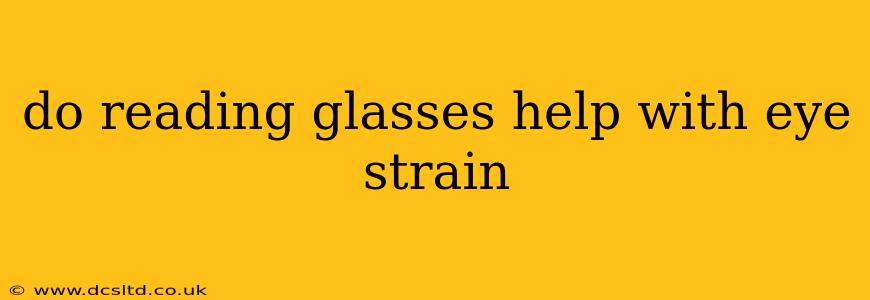Eye strain is a common complaint, often stemming from prolonged near-work activities like reading, working on computers, or using smartphones. The question of whether reading glasses can alleviate this discomfort is a pertinent one, and the answer is nuanced. While reading glasses can significantly help some people with eye strain, they aren't a universal solution. Let's delve deeper.
What Causes Eye Strain?
Before exploring the role of reading glasses, understanding the root causes of eye strain is crucial. Eye strain, or astigmatism, isn't a single condition but a symptom of various factors:
- Focusing Issues: Your eyes constantly adjust focus when switching between near and far objects. Difficulty with this accommodation, particularly as we age, leads to strain.
- Dry Eyes: Insufficient tear production or rapid evaporation can irritate your eyes and contribute to strain. Extended screen time often exacerbates this.
- Poor Lighting: Inadequate or harsh lighting makes your eyes work harder to focus, resulting in fatigue.
- Incorrect Posture: Poor posture when reading or working on a computer can strain your neck and shoulders, indirectly impacting your eye comfort.
- Uncorrected Refractive Errors: Conditions like nearsightedness (myopia), farsightedness (hyperopia), and astigmatism necessitate correction to prevent eye strain.
How Reading Glasses Address Eye Strain
Reading glasses primarily help with eye strain related to focusing difficulties, specifically presbyopia. Presbyopia is the age-related loss of near focusing ability, typically beginning in your 40s. As your eye's lens loses flexibility, it struggles to focus on close objects. Reading glasses provide the extra focusing power needed to see clearly up close, thereby reducing the strain associated with accommodating for near vision.
If your eye strain is primarily due to presbyopia, reading glasses can be incredibly beneficial. They make reading and other near tasks much more comfortable, reducing eye fatigue, headaches, and blurry vision. However, they won't help with other causes of eye strain, such as dry eyes or poor posture.
Do Reading Glasses Help Everyone with Eye Strain?
No, reading glasses aren't a cure-all for everyone experiencing eye strain. Their effectiveness depends on the underlying cause. If your eye strain stems from uncorrected refractive errors other than presbyopia (like myopia or astigmatism), reading glasses might even worsen the problem. They only address the focusing issue for near vision; they don't correct other vision problems. In such cases, a comprehensive eye exam and prescription eyeglasses are necessary.
What if Reading Glasses Don't Help My Eye Strain?
If you're still experiencing eye strain despite wearing reading glasses, several other factors might be at play. Consider these possibilities:
- Incorrect Prescription: If your reading glasses have an incorrect prescription, they won't effectively alleviate your eye strain. A proper eye exam from an optometrist or ophthalmologist is crucial.
- Other Underlying Conditions: Underlying eye conditions like dry eye syndrome, blepharitis, or other refractive errors may require specific treatments beyond reading glasses.
- Lifestyle Factors: Ensure you're practicing good eye hygiene, taking regular breaks from near-work activities (the 20-20-20 rule is a helpful guideline), maintaining proper posture, and working in well-lit environments.
Are there Alternatives to Reading Glasses for Eye Strain?
Besides reading glasses, several options might help manage eye strain:
- Computer Glasses: These glasses are specifically designed to reduce eye strain from digital screens. They typically have a different lens prescription compared to reading glasses.
- Eye Drops: Artificial tears can alleviate dry eye symptoms, a common contributor to eye strain.
- Ergonomic Adjustments: Optimizing your workspace with proper lighting, comfortable seating, and screen positioning can significantly reduce strain.
When Should I See an Eye Doctor about Eye Strain?
Persistent or worsening eye strain warrants a visit to an eye doctor. They can diagnose the underlying cause of your eye strain and recommend the most appropriate treatment, which might include prescription glasses, eye drops, or other interventions. Don't hesitate to seek professional help if your eye strain significantly impacts your daily life.
In conclusion, while reading glasses can be highly effective for alleviating eye strain related to presbyopia, they are not a universal solution. Understanding the underlying cause of your eye strain is key to finding the right treatment. A comprehensive eye exam is always recommended if you're experiencing persistent or worsening eye strain.
